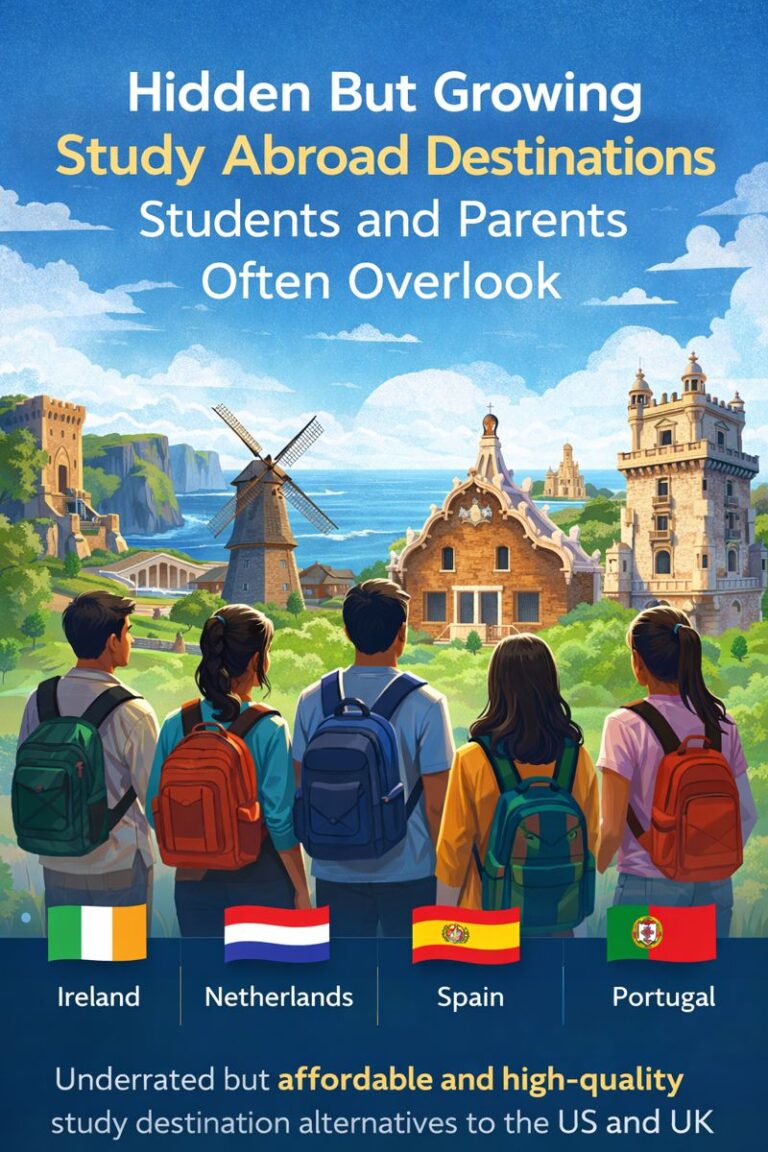The Netherlands is known for being one of the most student-friendly countries in the world. Over 100,000 international students move to the Netherlands each year to pursue bachelor’s, Master’s, and PhD programmes. The country offers high-quality degrees, the English language as a medium, a safe and open society, and easy access to the rest of Europe.
Why the Netherlands is a top choice for international students
World‑Class Universities
The universities are high-ranking: TU Delft is ranked 57 worldwide, the University of Amsterdam is ranked 65, and Wageningen University is ranked 119. They are all featured in the QS Top 200 list of 2025.
English‑Taught Programmes: In the Netherlands over 2,200 programmes are taught in English. This is the highest in continental Europe.
Student‑Centric Cities
The campuses are well integrated within the cities. The students get to experience the Dutch culture and get to know the locals.
The country is famous for its cycling infrastructure. The daily commutes are inexpensive, healthy and eco‑friendly.
Post‑Study Opportunities
In the Netherlands, graduates can stay in the country for up to one year on a residence permit and apply for jobs.
Factors to consider when choosing a student city
How do you choose the perfect city in the Netherlands?
You need to consider these factors:
Academic Discipline: Delft and Eindhoven are known for technology courses; Wageningen is a great option if you plan to study life sciences, and Leiden and Utrecht are the right choice for social sciences.
Cost of Living: The rent varies greatly from city to city. Groningen can be the cheapest, average rent is €550. Amsterdam is definitely the most expensive, with average rent being up to €1,200 per month.
Cultural Fit: The bigger cities attract a lot of international students because of vibrant nightlife and festivals. However, the smaller cities have their own charm, green space, and more engagement with the community.
Transport Links: You want to choose a city that has good train links and easy commute options.
Accommodation Availability: You can choose between university halls, private housing and homestays. Living on campus is preferred by most students because it is financially a better decision, and you save up on travel as well. Choose a city that offers the kind of accommodation you are looking for.
Best cities in the Netherlands for international students
| City | Main University | Founded | Int’l Student% | Average Rent | Why Choose this City? |
| Amsterdam | University of Amsterdam (UvA) | 1632 | 25 % | €850–€1,200 | Cultural capital & known for quality research programmes |
| Delft | Delft University of Technology (TU Delft) | 1842 | 40 % | €650–€900 | Best engineering programmes & beautiful canal‑side campus |
| Eindhoven | Eindhoven University of Technology (TU/e) | 1956 | 35 % | €650–€900 | Tech & design hub (Philips & Co was founded here) |
| Groningen | University of Groningen | 1614 | 30 % | €550–€800 | Affordable, lively nightlife & ranked among the top 80 universities worldwide |
| Leiden | Leiden University | 1575 | 20 % | €700–€950 | The oldest university in the Netherlands, known for social sciences & legal studies programmes |
| Rotterdam | Erasmus University Rotterdam | 1913 | 35 % | €750–€1,000 | Beautiful modern architecture & the leading business school |
| Tilburg | Tilburg University | 1927 | 18 % | €600–€850 | Famous as the festival city & affordable for students |
| Utrecht | Utrecht University | 1636 | 22 % | €700–€1,000 | Centrally located, houses historic canals & student-friendly |
| Wageningen | Wageningen University & Research | 1918 | 50 % | €600–€850 | Global leader in agriculture & environment |
| Nijmegen | Radboud University Nijmegen | 1923 | 15 % | €650–€900 | Oldest city with green campuses & strong bioscience programmes |
| The Hague | The Hague University of Applied Sciences | 1987 | 12 % | €700–€1,000 | Access to international court & governance internships |
Amsterdam
Academics: The University of Amsterdam is ranked No. 65 according to the QS rankings 2025. The university is famous for its quality research and is one of the best in the Netherlands. Vrije Universiteit Amsterdam offers 350+ English-taught programmes in humanities, sciences, business, and more.
City Life: Amsterdam is a cultural hub. The city houses some of the most famous and beautiful museums, including the Rijksmuseum and the Van Gogh Museum.
Nightlife: Amsterdam is famous for its vibrant nightlife. The cover charges at clubs range from €10 to €15, and student discounts are common.
Delft
Engineering Focus: Delft University of Technology is ranked No. 57 according to the QS rankings 2025. The university has strong ties with the industry, especially corporations like ASML and Shell. This offers students invaluable opportunities.
Student Community: “Delftsch Studenten Corps” and sports teams foster community in a town of just 100,000 people.
Eindhoven
Innovation Ecosystem: Home to the High Tech Campus and Philips Museum.
Academic‑Industry Link: Eindhoven University of Technology’s Design Academy and Philips co‑develop future technology.
Groningen
Affordability: The city is super affordable for students. It has the lowest rent when compared to other student cities. Over 30 % of the total population is students.
Rankings: The University of Groningen is ranked top 80 globally. The city has a history of being progressive. The University of Groningen hired the first female Dutch lecturer in 1917.
Leiden
Historic Prestige: Leiden University has a rich and impressive history. It was founded in 1575. Rembrandt studied here.
Proximity: The location is very convenient, and you have easy access to other student cities. It is only 15 minutes from The Hague and 30 minutes from Amsterdam by train.
Academic Strengths: Leiden University is famous for programmes in law, social sciences, and arts & culture.
Rotterdam
Modern Metropolis: The city was rebuilt after World War II and is celebrated for its contemporary architecture. The Markthal and Cube Houses are inspiring.
Erasmus University: It is ranked top 72 worldwide in economics and business.
Port: The city houses Europe’s largest port. This gives students opportunities in logistics and maritime studies.
Tilburg
Festivals: The city hosts the famous Tilburg Fair and music events that draw 200,000 plus visitors. If you wish to make a career in music, this city is full of opportunities.
Student Focus: Tilburg University is known for courses in social sciences and business, and the cost of living is lower compared to other student cities.
Utrecht
Central Hub: It is centrally located, and the entire country is very accessible from Utrecht. It is only 25 minutes from Amsterdam by train.
Historic Core: The unique canal wharves have been converted into cafés and shops along the Oudegracht.
Wageningen
Green City: It is the country’s food valley and research cluster. Over 50% of the students are international.
Global Leader: It is number 1 in Agriculture and Forestry and offers students opportunities to build careers in the same.
Nijmegen
Oldest City: 2,000-year-long history. The Radboud University is known for courses in medicine and the humanities.
Connectivity: It has four train stations and is 1 hour from Amsterdam by train.
The Hague (Den Haag)
International City of Peace: Home to the International Court of Justice, ICC, and numerous embassies.
Applied Sciences: THUAS offers programmes in security, governance, and creative industries.
Coastal Access: Scheveningen beach 20 min by tram.
Student life and living experience
Cycling: Over 35,000 km of dedicated cycle paths. Almost everyone owns a bike. This practice has resulted in students being healthier and having access to better air quality.
Clubs & Societies: 1,000+ student associations covering sports, arts, debating, and cultural exchange.
Festivals: King’s Day, Mysteryland (Lelystad), Eurosonic (Groningen), Valkhof Festival (Nijmegen). The Netherlands is a cultural hub that offers unique one of a kind experiences.
Accommodation options
University Halls: These are preferred by students because they are subsidised. (€350–€500per month). However, these are limited and in high demand.
Private Student Housing: This can be relatively expensive but very comfortable, and you can choose from a variety of amenities. The Student Hotel, XIOR, and DUWO are platforms worth looking into.
Shared Flats: A lot of students prefer sharing with students from the same university. Some platforms to check out are: Kamernet, HousingAnywhere, and Pararius.
Homestays: If you are looking for a cheaper and safer alternative, living with host families is a great option. This also immerses you in the culture of the city.
Cost of living comparison
| City | Rent | Food/Transport | Monthly Total |
| Amsterdam | €1,000 | €300 | €1,350 |
| Delft | €800 | €250 | €1 100 |
| Eindhoven | €800 | €250 | €1 100 |
| Groningen | €650 | €200 | €950 |
| Leiden | €850 | €250 | €1,150 |
| Rotterdam | €900 | €275 | €1,200 |
| Tilburg | €700 | €200 | €950 |
| Utrecht | €900 | €275 | €1,200 |
| Wageningen | €800 | €250 | €1 100 |
| Nijmegen | €800 | €225 | €1,075 |
| The Hague | €900 | €275 | €1,200 |
Universities and academic life
Teaching Style: The Netherlands’ teaching style is multi-faceted. Students are through seminars, tutorials, and group projects. Self-study is encouraged.
Research Funding: The country is famous for producing high-quality research. Students get to be a part of EU Horizon projects and benefit from corporate partnerships. Eindhoven University of Technology partners with Phillips, and Delft University of Technology partners with companies like Shell.
Language Support: Students can get access to free Dutch courses and learn to communicate with the locals better. Buddy programmes pair locals with international students.
Tips for adjusting to the Dutch student life
Municipal Registration (BRP): You need this registration for a residence permit, health insurance, and opening a bank account.
Health Insurance: Dutch public insurance is mandatory. It costs around €110 per month.
Part‑Time Work: You can work 16 hours per week while studying and full‑time during the summer break.
Networking: You will benefit from joining LinkedIn groups for your university and attending career fairs like the Erasmus Recruit.
Explore: You can use the OV‑chipkaart and get student discounts for travelling by train and bus.
Conclusion
The Netherlands is one of the best places in the world for international students. Do your research and make an informed decision about the city you choose to study in. The experience will be invaluable.
FAQs
1. Which are the best cities in the Netherlands for international students?
The top choices are Amsterdam, Delft, Eindhoven, Groningen, Leiden, Rotterdam, Tilburg, Utrecht, Wageningen, Nijmegen, and The Hague. Each of these cities has its own charm and unique attractions, and a thriving international student community.
2. What is student life like in the Netherlands?
Student life in the Netherlands is quite lively. You get to benefit from the cycling culture, active student associations, multicultural festivals, and high academic standards. The student life is balanced with lots of options for leisure activities and opportunities to travel nd explore.
3. How much does student accommodation cost in major Dutch cities?
The rent greatly depends on the city you choose. In cheaper cities like Groningen and Tilburg, it is around €550. In more expensive cities like Amsterdam and Utrecht, it can be around € 1,200.
4. Which Dutch cities have top‑ranked universities?
Some of the top-ranking universities are: Delft University of Technology (#57 QS), University of Amsterdam (#65 QS), University of Groningen (#80 QS), Eindhoven University of Technology (#101–150 QS), and Wageningen University (#119 QS).
5. What are the most affordable cities for students in the Netherlands?
Groningen, Tilburg, and Delft are the most affordable cities. They have the cheapest rent and the lowest cost of living. These cities are excellent for budget‑conscious students.


















